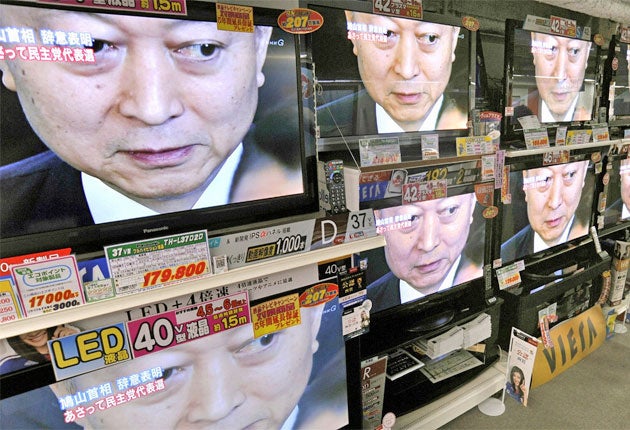Japanese PM resigns after failing to take on US over Okinawa base

Yukio Hatoyama, Japan's Prime Minister, quit yesterday after a vertiginous eight-month fall in popularity caused by money scandals and a humiliating retreat on one of his key pledges, the relocation of a US military base.
Fighting back tears, Mr Hatoyama apologised to a live national television audience for his "failure to change politics" and put Japanese people first. "We need to bring back a thoroughly clean Democratic Party," he said.
The fourth Japanese prime minister in a row to step down after less than a year in office, Mr Hatoyama was under intense pressure from his fellow Democrats (DPJ) to give way before a general election on 11 July.
Dubbed "The Alien" for his staring eyes and penchant for head-scratching philosophical rambling, Yukio Hatoyama was always an unusual choice of leader. The offspring of a political and business dynasty, Mr Hatoyama built a solid academic career before following his grandfather, father and brother into politics. But he never quite lost the air of a slightly befuddled professor.
Mr Hatoyama's image as a political ditherer unable to make uncomfortable decisions was sealed by his failure to settle a dispute over a controversial US Marine base on the island of Okinawa. Before taking office, he promised to move the Futenma Air Station out of the prefecture as part of a broader attempt to challenge what he called Japan's subservience to US interests. He made little secret of his desire to end one of his country's great injustices: that 99 per cent of Japanese never have to face the consequences of its military alliance with the US because tiny Okinawa – with 1 per cent of the population and 75 per cent of American military facilities – carries most of the load.
But despite promising to cancel a 2006 deal foisting a huge military heliport on one of Okinawa's most scenic areas, the Prime Minister had no stomach for a fight with Washington, which would have questioned the foundations of Japan's postwar defence architecture.
The pledge was an embarrassment for the government as it spent months searching in vain for an alternative site, before arriving back at square one. Mr Hatoyama's decision last month to accept the unpopular deal made by the previous government, pledging to shift the base to a disputed site off the northern Okinawa coast, was greeted with fury by the islanders and media mocking. His fate was sealed by the decision of pacifists from coalition partners the Social Democrats to resign in protest last weekend.
DPJ politicians hope that the Prime Minister's departure will draw a line under the base affair and give them a fighting chance in next month's upper house poll. Finance Minister Naoto Kan, who is also Deputy Prime Minister, is tipped to take over tomorrow. He will need to resuscitate cabinet approval ratings that have plummeted below 20 per cent from over 70 per cent last year.
Swept into office last September in a landslide, the outgoing Prime Minister and DPJ secretary general Ichiro Ozawa, who also resigned, were quickly mired in money scandals.
Revolving door
Yukio Hatoyama's announcement yesterday meant he was the fourth prime minister to step down in as many years.
Shinzo Abe
He was Junichiro Koizumi's appointed successor but his administration repeatedly stumbled. Four of his cabinet ministers resigned due to financial improprieties, one a week after he was appointed, and his agriculture minister committed suicide over a scandal. His approval ratings sank and his party lost its decades-long majority in parliament's upper house. He resigned suddenly in September 2007, citing health problems.
Yasuo Fukuda
He took office as a political veteran, but faced challenges from the opposition. He tried to take a populist tack but was largely seen as dour and curt, and his major legislation was often held up in a divided parliament. Fukuda quit abruptly in September 2008, saying he was unable to break an impasse with the opposition.
Taro Aso
This long-serving politician held several cabinet posts before becoming prime minister. He vowed to restore the public trust in his party, but his support suffered amid a deepening recession, and he hurt his standing through insensitive comments that upset Japan's neighbours. Aso left office in September 2009 after his long-ruling Liberal Democratic Party was defeated soundly in lower-house elections. AP
Join our commenting forum
Join thought-provoking conversations, follow other Independent readers and see their replies
Comments